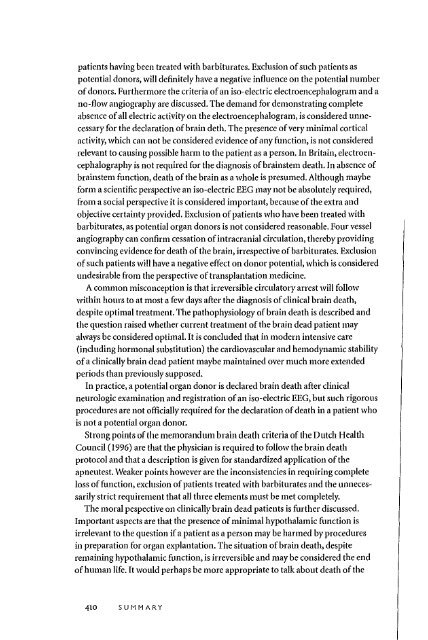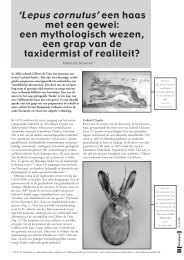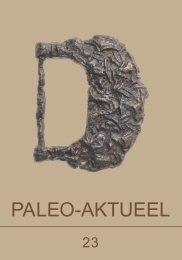Geven en nemen - dr Erwin JO Kompanje
Geven en nemen - dr Erwin JO Kompanje
Geven en nemen - dr Erwin JO Kompanje
You also want an ePaper? Increase the reach of your titles
YUMPU automatically turns print PDFs into web optimized ePapers that Google loves.
pati<strong>en</strong>ts having be<strong>en</strong> treated with barbiturates. Exclusion of sueh pati<strong>en</strong>ts as<br />
pot<strong>en</strong>tial donors, will definitely have a negative influ<strong>en</strong>ee on the pot<strong>en</strong>tial number<br />
of donors. Furthermore the criteria of an iso-electric electro<strong>en</strong>cephalogram and a<br />
no-flow angiography are disCllssed. The demand for d<strong>en</strong>lOnstrating complete<br />
abs<strong>en</strong>ce of all electric activity on the eleetro<strong>en</strong>cephalogram, is considered unnecessar}'<br />
for the declaration ofbrain deth. The pres<strong>en</strong>ce of very minimal cortical<br />
activity, which can not be considered evid<strong>en</strong>ce of an}' functioll, is not eonsidered<br />
relevant to causing possible harm to the pati<strong>en</strong>t as a person. In Britain, electro<strong>en</strong>cephalography<br />
is not required for the diagnosis ofbrainstem death. In abs<strong>en</strong>ce of<br />
brainstem function, death of the brain as a whole is presumed. Although maybe<br />
form a sci<strong>en</strong>tific perspective an iso-electric EEG may not be absolutely required,<br />
from asodal perspective it is considered important, because of the extra anel<br />
objective certainty provided. Exclusion of pati<strong>en</strong>ts who have be<strong>en</strong> treated with<br />
barbiturates, as pot<strong>en</strong>tial organ donors is not considered reasonable. Four vessel<br />
angiography can confirm cessation of intracranial circulatioll, thereby providing<br />
convincing evid<strong>en</strong>ee for death of the brain, irrespective ofbarbiturates. Exclusion<br />
of sueh pati<strong>en</strong>ts will have a negative effect on donor pot<strong>en</strong>tial, which is eonsidered<br />
Ullelesirable from the perspeetive of transplantation medicine.<br />
A COlnmon misconception is that irreversible circulatory arrest wi1l follow<br />
within hOlUS to at most a few da}'s aftel' the eliagnosis of clinical brain death,<br />
despite optimal treatm<strong>en</strong>t. The pathophysiology ofbrain death is described and<br />
the question raised whether curr<strong>en</strong>t treatm<strong>en</strong>t of the brain dead pati<strong>en</strong>t may<br />
always be eonsidered optimal. It is eoncluded that in modern int<strong>en</strong>sive care<br />
(including hormonal substitution) the cardiovascular and hemadynamie stability<br />
of a c1inieally brain dead pati<strong>en</strong>t maybe maintained over mueh more ext<strong>en</strong>ded<br />
periods than previously supposed.<br />
In practiee, a pot<strong>en</strong>tial organ donor is deelared brain death after clinical<br />
neurologie examination and registration of an iso-electric EEG, but sueh rigorous<br />
procedures are not officially required for the deelaration of death in a pati<strong>en</strong>t who<br />
is not a pot<strong>en</strong>tial organ donor.<br />
Strong points of the memorandum brain death criteria of the Dutch Health<br />
COUllCil (1996) are that the physician is required to follow the brain death<br />
protocol and that a description is giv<strong>en</strong> for standardized application of the<br />
apneu test. Weaker points however are the inconsist<strong>en</strong>cies in requiring complete<br />
loss of function, exclusion of pati<strong>en</strong>ts treated with barbiturates anel the unneeessarily<br />
striet requirem<strong>en</strong>t that all tluee elem<strong>en</strong>ts must be met completely.<br />
The moral pespective on elinically brain dead pati<strong>en</strong>ts is further discussed.<br />
Important aspects are that the pres<strong>en</strong>ce of minimal hypothalamic function is<br />
irrelevant to the questioll if a pati<strong>en</strong>t as a person may be hanned by procedures<br />
in preparation for organ explantation. The situation ofbrain death, despite<br />
remaining hypothalamie function, is irreversible and may be considered the <strong>en</strong>d<br />
ofhuman life. It would perhaps be more appropriate to talk about death of the<br />
410 su M MAR Y








